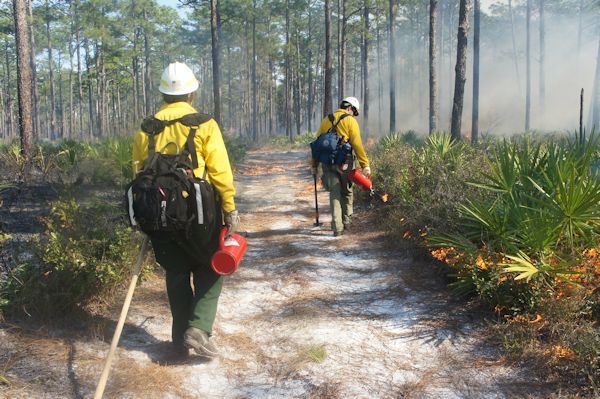SEJournal Online is the digital news magazine of the Society of Environmental Journalists. Learn more about SEJournal Online, including submission, subscription and advertising information.
 |
| Job Corps graduates were part of the Davidson River Initial Attack Crew in North Carolina's Pisgah National Forest, September of 2012. Much of the work of those taking part in the jobs program is either direct fire-fighting or the sort of conservation work that reduces potential fire damage. Photo: U.S. Forest Service. Click to enlarge. |
TipSheet: Closure of Civilian Conservation Centers Ignites Controversy
By Joseph A. Davis
The Trump administration recently announced that it is closing some of the Civilian Conservation Centers that give disadvantaged young people outdoor jobs and training. And that may mean a news story near you.
The U.S. Forest Service program, in a May 24 conference call by Forest Service Chief Vicki Christiansen with teachers, administrators and vocational staff, said it will lay off an estimated 1,100 employees — the largest federal downsizing since 2011.
The news quickly became a local story surrounding the nine centers that will be immediately closed in states like Arkansas, Kentucky, Montana, North Carolina, Oregon, Wisconsin, Virginia and Washington.
The move has generated news coverage in Montana, Wisconsin, South Dakota, Oregon and North Carolina. Already, Sen. John Tester (D-Mont.) has put forth a bill to stop the layoffs, which impact his state.
What remains of the program, another 2,100 jobs, will be transferred to the Labor Department and privatized. Those remaining 16 centers are in Colorado, Idaho, Kentucky, Missouri, Montana, Nebraska, North Carolina, Oregon, South Dakota, Tennessee, Utah, Washington and West Virginia.
Backstory
The Civilian Conservation Centers, or CCC, started back in 1964 under former President Lyndon B. Johnson to give education and vocational training to young people aged 16 to 24.
The CCC program was part of the Job Corps from its beginning, but hearkens back to a much older federal enterprise, the Civilian Conservation Corps, formed in 1933 during the Great Depression to provide jobs for unemployed young men.
The three million young men who participated in the earlier program built many important infrastructure features of the National Park System and National Forest System. And as the new CCC program evolved to date, it has often focused on forest conservation projects and wildfire fighting skills.
Why it matters
Sadly, many young people in the United States lack the education, skills and job experience to easily get a job that will support them or a family. The CCC, though small in scale, made that possible for those taking part.
The program has drawn from economically disadvantaged populations, as does the Job Corps itself. Not only do participants work, but in the program they can get vocational training and hands-on experience, and earn certificates and diplomas that will help them find better jobs.
Politicians today talk a lot about “infrastructure” as a way to refurbish crumbling public resources and provide needed jobs. The conservation centers, which are scattered among many congressional districts, are a prime example of such a program already in existence.
And unlike the multibillion-dollar infrastructure extravaganzas bandied about by the Trump administration and some Congressional leaders, it is modest in cost.
Moreover, wildfires are raging longer, larger and more destructively than ever in this era of climate change. Much of the work in the Forest Service’s CCC is either direct fire-fighting or the sort of conservation work that reduces potential fire damage.
At the peak of the fire season, the demand for firefighting person-power is intense, and the CCC helps meet it.
Story ideas
- Where is the Civilian Conservation Center nearest to you? This map may help. Visit if you can.
- What services are provided by your local CCC? Will those services continue?
- What has been the response of state and local members of Congress and other elected officials to the shutdown?
- Find people who provide training at your local CCC but who do not work for the Forest Service or another federal agency. They may be freer to talk.
Reporting resources
- Labor Department press release from May 24, 2019, listing names and locations of centers to be closed and transferred.
- National Federation of Federal Employees, the union representing employees of the Civilian Conservation Centers.
Joseph A. Davis is a freelance writer/editor in Washington, D.C. who has been writing about the environment since 1976. He writes SEJournal Online's TipSheet and Reporter's Toolbox columns. Davis also directs SEJ's WatchDog Project and writes WatchDog Tipsheet, and compiles SEJ's daily news headlines, EJToday.
* From the weekly news magazine SEJournal Online, Vol. 4, No. 24. Content from each new issue of SEJournal Online is available to the public via the SEJournal Online main page. Subscribe to the e-newsletter here. And see past issues of the SEJournal archived here.













 Advertisement
Advertisement 



